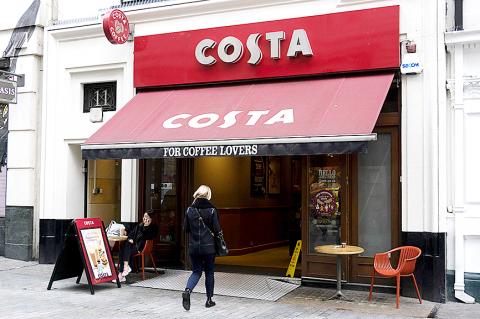Coca-Cola Co has agreed to buy the world’s second-largest coffee chain, Costa Coffee, from Britain’s Whitbread PLC for an enterprise value of £3.9 billion (US$5.1 billion), opening a new front in its push away from traditional sodas.
Whitbread yesterday said in a statement that the deal, which is to give Coke almost 4,000 coffee outlets in the UK and across Europe, has been agreed unanimously by the Whitbread board as in the best interests of shareholders.
Whitbread, which had been in the process of demerging its coffee business from its hotel chain, acquired Costa in 1995 for £19 million when it had only 39 shops.

Photo: AFP
For Coca-Cola, the deal adds to its efforts to move away from fizzy drinks toward healthier options for increasingly health-conscious consumers.
“Hot beverages is one of the few segments of the total beverage landscape where Coca-Cola does not have a global brand,” Coca-Cola chief executive officer James Quincey said. “Costa gives us access to this market with a strong coffee platform.”
Makers of soft drinks are branching out as consumers seek alternatives to sugary sodas. Earlier this month, PepsiCo Inc agreed to pay US$3.2 billion for SodaStream Ltd, which makes carbonated-water dispensers.
Costa outranks Starbucks Corp in the UK and is expanding in markets such as China. The company was one of the few big coffee chains up for sale after Nestle SA and the Reimann family’s investment company JAB Holding Co both went on an acquisition spree in the segment.
Coca-Cola sells coffee under the Georgia brand in Japan and has some other local products for specific markets.
Whitbread said it would reduce debt and contribute to the pension fund with the proceeds from the deal, and further expand its hotel chain Premier Inn in the UK and Germany.
“The announcement today represents a substantial premium to the value that would have been created through the demerger of the business and we expect to return a significant majority of net proceeds to shareholders,” Whitbread chief executive officer Alison Brittain said.
Additional reporting by Bloomberg

BIG BUCKS: Chairman Wei is expected to receive NT$34.12 million on a proposed NT$5 cash dividend plan, while the National Development Fund would get NT$8.27 billion Taiwan Semiconductor Manufacturing Co (TSMC, 台積電), the world’s largest contract chipmaker, yesterday announced that its board of directors approved US$15.25 billion in capital appropriations for long-term expansion to meet growing demand. The funds are to be used for installing advanced technology and packaging capacity, expanding mature and specialty technology, and constructing fabs with facility systems, TSMC said in a statement. The board also approved a proposal to distribute a NT$5 cash dividend per share, based on first-quarter earnings per share of NT$13.94, it said. That surpasses the NT$4.50 dividend for the fourth quarter of last year. TSMC has said that while it is eager

‘IMMENSE SWAY’: The top 50 companies, based on market cap, shape everything from technology to consumer trends, advisory firm Visual Capitalist said Taiwan Semiconductor Manufacturing Co (TSMC, 台積電) was ranked the 10th-most valuable company globally this year, market information advisory firm Visual Capitalist said. TSMC sat on a market cap of about US$915 billion as of Monday last week, making it the 10th-most valuable company in the world and No. 1 in Asia, the publisher said in its “50 Most Valuable Companies in the World” list. Visual Capitalist described TSMC as the world’s largest dedicated semiconductor foundry operator that rolls out chips for major tech names such as US consumer electronics brand Apple Inc, and artificial intelligence (AI) chip designers Nvidia Corp and Advanced

Saudi Arabian Oil Co (Aramco), the Saudi state-owned oil giant, yesterday posted first-quarter profits of US$26 billion, down 4.6 percent from the prior year as falling global oil prices undermine the kingdom’s multitrillion-dollar development plans. Aramco had revenues of US$108.1 billion over the quarter, the company reported in a filing on Riyadh’s Tadawul stock exchange. The company saw US$107.2 billion in revenues and profits of US$27.2 billion for the same period last year. Saudi Arabia has promised to invest US$600 billion in the US over the course of US President Donald Trump’s second term. Trump, who is set to touch

SKEPTICAL: An economist said it is possible US and Chinese officials would walk away from the meeting saying talks were productive, without reducing tariffs at all US President Donald Trump hailed a “total reset” in US-China trade relations, ahead of a second day of talks yesterday between top officials from Washington and Beijing aimed at de-escalating trade tensions sparked by his aggressive tariff rollout. In a Truth Social post early yesterday, Trump praised the “very good” discussions and deemed them “a total reset negotiated in a friendly, but constructive, manner.” The second day of closed-door meetings between US Secretary of the Treasury Scott Bessent, US Trade Representative Jamieson Greer and Chinese Vice Premier He Lifeng (何立峰) were due to restart yesterday morning, said a person familiar